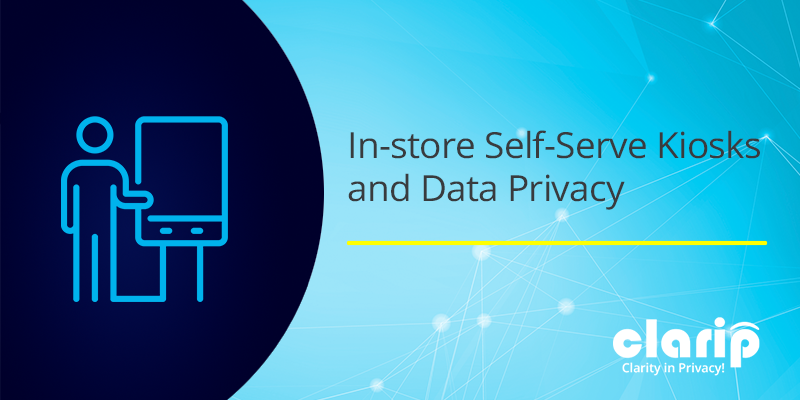In-store Self-Serve Kiosks and Data Privacy

In-store self-serve kiosks have emerged as a game-changer in the retail industry, offering customers a convenient and efficient way to make purchases, place orders, and access information. The fast-food chain Shake Shack reported a record bump in sales for 2023 Q2, prompting expansion of self-service kiosks to all locations. While these kiosks undeniably enhance the shopping experience and can lead to increased sales for businesses, they also come with a significant data privacy concern.
The Rise of In-Store Self-Serve Kiosks
Over the past decade, in-store self-serve kiosks have become a common sight in a variety of retail settings, including fast-food restaurants, grocery stores, coffee shops, and even clothing boutiques. Even many of the cashier displays are basically a kiosk. Customers being able to check themselves out can be convenient and fast, offering enhanced customer experience, reduced wait times, and increased revenue.
Massive Data Collection Behind the Screens
Customers are drawn to the convenience of the in-store kiosks, many are unaware of the extensive data collection happening behind the scenes. In-store self-serve kiosks routinely gather various types of information, which may include:
- Purchase History: Kiosks track the products or services customers order or purchase, creating detailed profiles of their preferences.
- Personal Information: If customers log in to their accounts or provide payment details, the kiosk collects personal data such as names, email addresses, and credit card information. Some of this data falls into sensitive personal information.
- Location Data: Some kiosks use GPS or other tracking methods to monitor customers’ movements within a store, allowing businesses to analyze foot traffic patterns.
- Biometric Touchscreen Interactions: Every tap, swipe, or button press on the kiosk’s screen is recorded, revealing which products or sections of the store are most appealing to customers.
- Surveillance: Advanced kiosks may incorporate cameras and microphones, raising concerns about audio and visual surveillance. This can also include biometric face capture powered by AI technologies.
- AI Technologies: Kiosks may use facial recognition technology powered by AI to identify users and prevent theft. AI-driven NLP (Natural Language Processing) enables kiosks to understand and respond to natural language queries. AI can analyze data collected from kiosk interactions to derive insights. This can help businesses make informed decisions about user preferences, popular services, and overall kiosk performance.
Balancing The Sales-Boost and Privacy Obligations
Because of the ease and convenience, most retailers are opting for self-service. Customers and regulators should consider the data privacy implications.
- Large volume of users: According to statista.com, as of December 2019, 47% of consumers in the United States claimed that they regularly used self-service checkouts. A further 31% of consumers had at some point used a self-service checkout.
- Unauthorized Data Sharing: Most in-store kiosks are provided by third party contractors. Retailers may be sharing customer data collected through kiosks with third parties without explicit consent, potentially leading to unwanted marketing messages or worse.
- Lack of Transparency: Self checkouts are performed quickly, with little to no hassle. Many customers are completely unaware of the extent of data collection and how their information is used, leading to a lack of informed consent.
- Data Retention: It is often unclear how long businesses and third-party providers retain the data collected through kiosks.
The Need for Clarity
As the use of in-store self-serve kiosks becomes more prevalent, there is a growing need for data privacy transparency. Privacy laws like the California Consumer Privacy Act (CCPA) cover both data collected in stores and online. Kiosks must provide a prompt that notifies the user upon collection of personal information, including how it is used and with whom information is shared, and provide a mechanism to opt out of the collection of personal information. In-store self-serve kiosks undoubtedly boost sales and offer convenience to customers, but they also raise legitimate data privacy concerns. Businesses must strike a balance between reaping the benefits of these kiosks and safeguarding sensitive personal information.
Clarip’s Data Privacy Governance Platform ensures transparency with users and compliance with all consumer privacy regulations. Clarip takes data privacy governance to the next level and helps organizations reduce risks, engage better, and gain customers’ trust!
Contact us at www.clarip.com/privacy/contact or call Clarip at 1-888-252-5653 for a demo.
Email Now:
Mike Mango, VP of Sales
mmango@clarip.com
Related Content:
Making the Case for Data Minimization
Automated Data Mapping
Data Discovery

 Data Risk Intelligence
Data Risk Intelligence Automated Data Mapping
Automated Data Mapping Do Not Sell/Do Not Share
Do Not Sell/Do Not Share Cookie Banner Solutions
Cookie Banner Solutions Consent & Preferences
Consent & Preferences Data Rights Requests
Data Rights Requests
